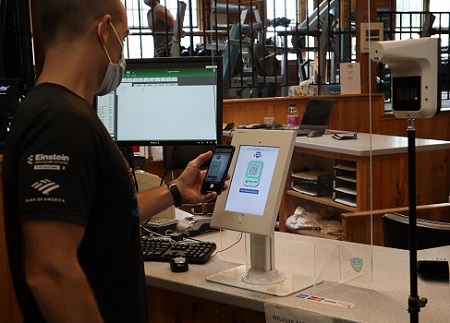Can Your Gym Become an Essential Business?
Written by Catherine S. Mitseas for Gym Insight
This fall, Planet Fitness made news when four locations in California owned by the same franchisee reopened under the designation of an “essential” business. Their tactic? Pay for a membership in the Medical Fitness Association and follow its phased reopening guidelines, while directly contacting local health officials for permission to open.
The gyms petitioned their Public Health Services department citing adherence to reopening guidelines published by MFA and vetted through the CDC. The MFA guidelines, in some cases, are stricter than the CDC’s published work: expanding social distancing recommendations based on a population’s health risk and the type of exercise.
The effort worked for Planet Fitness and, since then, more than 500 gyms have sought membership in the North Carolina-based nonprofit, according to their membership experience director Jason Aslanian.
The former PGA professional expressed awe at the surge of interest but wants to clarify a specific point: Membership in the MFA does not guarantee your business will be deemed essential by your local government.
Fortunately or unfortunately, that decision is made by local and state officials, and each state varies widely on which businesses are considered “essential.”
The 29-year-old organization, instead, provides a wealth of ongoing educational programs, conferences and seminars to individuals in the fitness industry, is the leading certification agency for organizations wishing to become accredited within the medical fitness arena, and provides access to industry research and trends.
Membership in the MFA delivers education and resources to health club owners but does not convey certification. Certification by the MFA as a medical fitness facility is a costly multi-year process that formally recognizes your center’s actions incorporating exercise-based therapies into client recovery programs. The accreditation comprehensively reviews your gym’s adherence to expected standards for medical fitness centers, including active physician oversight and degreed staff. However, even a full MFA certification does not automatically categorize your gym as “essential.”
There are over 940 medically integrated facilities nationwide, according to MFA’s research, but only 45 MFA-certified facilities in the United States. For more information on building relationships within the healthcare community, see our August blog, “Healthcare & Health Clubs.”
What’s Next on the Road to Becoming Essential?
Lobby and prepare, from the information out there. Every state is at a different point in opening, and the continued uncertainty swirling around increases in COVID-19 cases makes decisions difficult to pin down. However, a good offense is the best defense. By implementing the MFA’s guidelines and keeping up with the CDC your gym will be ready when your state flips the switch. If there seems to be wiggle room in your community, go to the local public health services department and keep asking questions until you find the person with the best answer.
Arm yourself with relevant state and local rules that apply to each of your business’s physical locations. Review them and determine if your business falls within any exceptions to the industry shutdown. If there is any question as to whether you are an essential business, prove to the county you’re a community resource with a dedicated group of clients who need and rely on you for their physical well being. Or ask an attorney to do the talking for you.
Keep your chin up and your hands clean, and soon your company will be stronger, better informed, and ready to run burpees around the competition.





